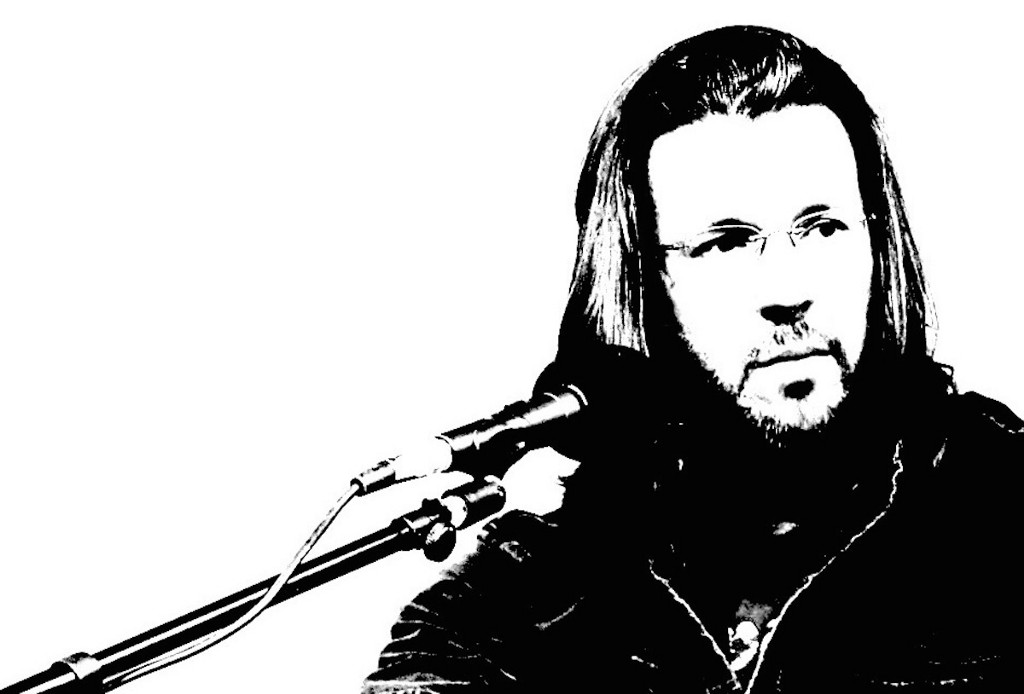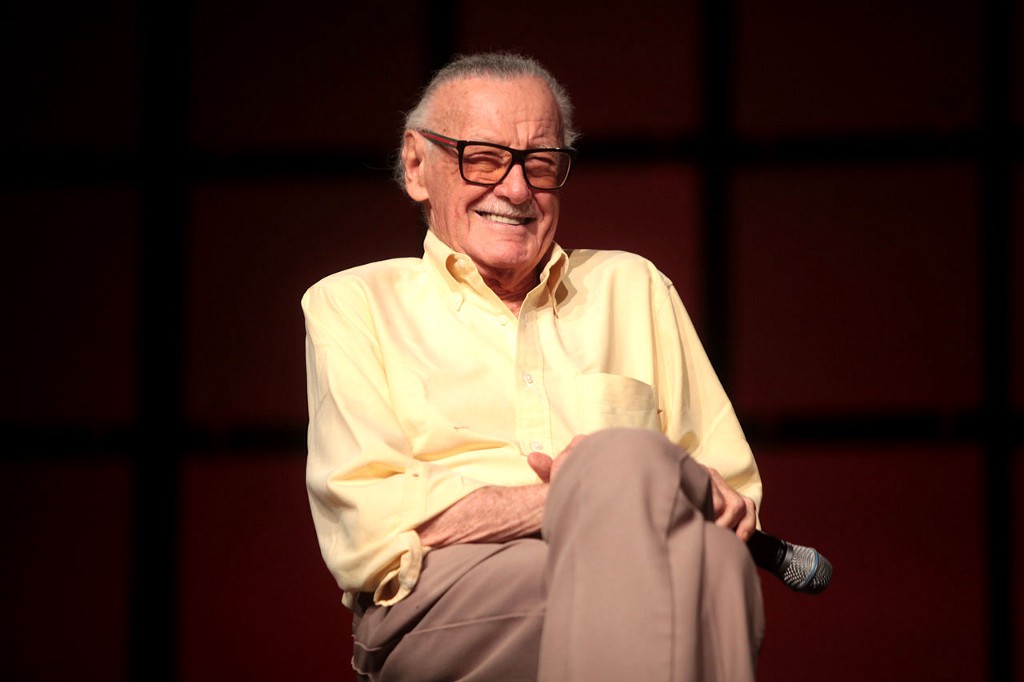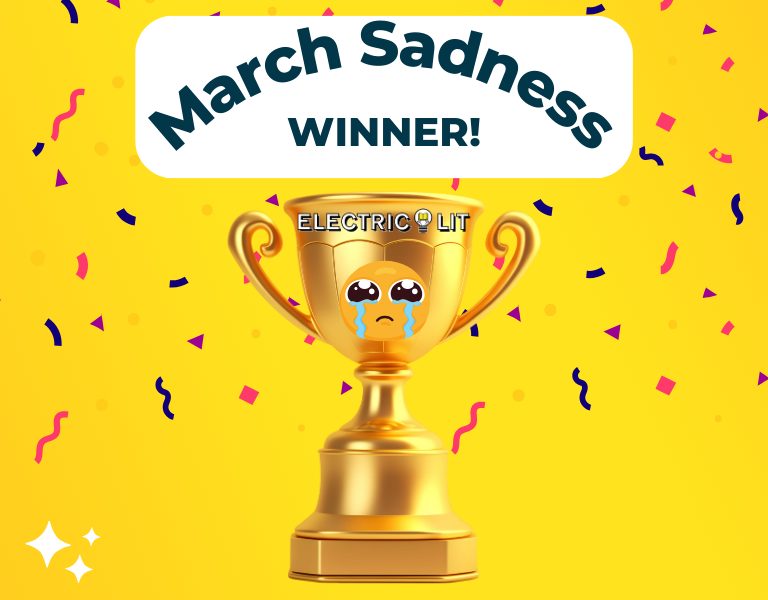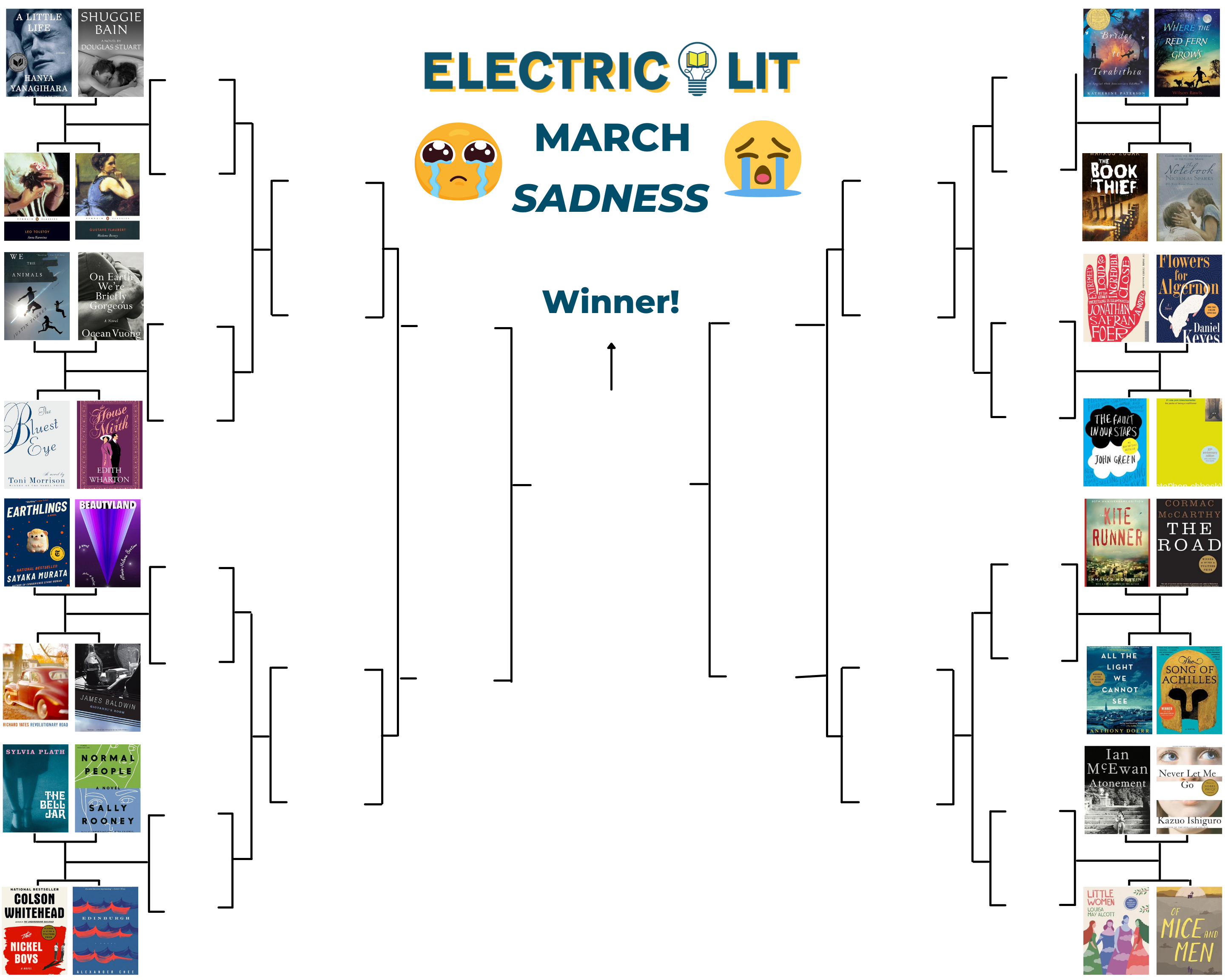interviews
A Brand New Interview with David Foster Wallace
This discussion of postmodernism, translation, and the internet has never been published in English

Eighteen years ago, writer and translator Eduardo Lago sat down with David Foster Wallace for a discussion that ranged from pedagogy to tennis to the influence of the internet on literature. The interview remained unpublished until Lago, an award-winning Spanish novelist, critic, and translator who teaches at Sarah Lawrence College, included it in his new book Walt Whitman ya no vive aquí, ten years after Wallace’s death. It has never been published before in English. The conversation has been lightly edited for readability.
Eduardo Lago: I know you’re not teaching right now, but can you talk a little bit about the reading lists of your courses?
David Foster Wallace: Most of what I teach is writing classes where we’re concentrating more on the student’s own writing. When I teach literature classes, I’ve taught everything from freshman literature, where the department will buy an anthology and I will teach them John Updike’s “A & P,” and John Cheever’s “The Five-Forty-Eight,” and Ursula le Guin’s “The Ones Who Walked Away From Omelas,” “The Lottery” by Shirley Jackson, a lot of very what I consider to be very standard stories that are in all the anthologies. I’ve tried teaching more ambitious or strange or difficult fiction, but with freshmen and sophomores their preparation isn’t very good and it doesn’t work well. Graduate literature courses are usually themed courses, so what the reading lists are depends a certain amount on how I design the course, as I’m sure you know. I’ve taught a fair amount of Cormac McCarthy, who’s a writer I admire a great deal, and Don DeLillo and William Gaddis. I’ve taught quite a bit of William Gass, but usually his earlier books, and I teach poetry … I’m not a professional poet but I’m an avid reader of poetry, so I teach most of the contemporary poetry that’s available in book form.
EL: Do you consider yourself an accessible writer, and do you know what kind of people read your books?
DFW: That’s a very good question. I think the sort of work I do falls into an area of American fiction that, yes, that is accessible, but that is designed for people who really like to read and understand reading to be a discipline and to require a certain amount of work. As I’m sure you know, most of the money in American publishing gets made in books — some of which I think are very good — that don’t require much work. They’re almost more like motion pictures, and people read them on airplanes and at beaches. I don’t do stuff like that. But of the American writers I know who do some of the more demanding fiction, I think I’m one of the more accessible ones, simply because when I’m working, I’m trying to make it as simple as possible rather than trying to make it as complicated as possible. There’s some fiction that’s very good that I think is trying to be difficult by putting the reader through certain sorts of exercises. I’m not one of those, so within the camp people usually talk about me being one of the more accessible ones, but that camp itself is not regarded as very accessible and I think it tends to be read by people who have had quite a bit of education or a native love of books and for whom reading is important as an activity and not just something to do to pass the time or entertain themselves.
I think I’m one of the more accessible ones simply because I’m trying to make it as simple as possible rather than trying to make it as complicated as possible.
EL: I’ve read in a number of places that you intended Infinite Jest to be a sad book. Can you talk specifically about that aspect of the novel and what else were you intending to do when you started writing it?
DFW: I think what I meant by that was that there are some facts about American culture, particularly for younger people, that seem to me to be far clearer to people who live in Europe than to Americans themselves, which is that in many ways America is a wonderful place to live from a material standpoint, and its economy is very strong and there’s a great deal of material plenty, and yet — let’s see, when I started that book I was about 30, sort of upper middle class, white, had never suffered discrimination or any poverty that I myself had not caused, and most of my friends were the same way, and yet there was a sadness and a disconnection or alienation among I would say people under 40 or 45 in this country, that — and this is probably a cliche — you could say dates from Watergate, or from Vietnam or any number of causes. The book itself is attempting to talk about the phenomenon of addiction, whether it’s addiction to narcotics or whether it’s addiction in its original meaning in English which has to do with devotion, almost a religious devotion, and trying to understand a kind of innate capitalist sadness in terms of the phenomenon of addiction and what addiction means. Usually I would tell people I meant to do it a sad book because when I did a lot of interviews about Infinite Jest all people would seem to want to talk about was that the book was very funny and they wanted to know why the book was so funny and how it was supposed to be so funny, and I was honestly puzzled and disappointed because I had seen it as a very sad book, and that was my attempt to explain to you the sadness that I’m talking about.
EL: How would you define your literary generation?
DFW: Boy.
EL: If you believe in that.
DFW: Can you explain the question a little bit, say who are the writers of the generation?
EL: Perhaps I mean that you belong in a certain age group that has inherited a literary tradition that you are trying to transform somehow. In other words, what are young American writers today like yourself — in a certain type of fiction because there are many different approaches to literature — doing. Do you think you belong in a group where your original work plays a role, or something like that?
DFW: Well, I don’t know. See, when people would ask me that question before it was because I was very young and I was in the youngest generation, and I think there’s probably a whole new generation now. A generation in American fiction is probably every five or seven years. Usually when people talk to me about my work, the other younger writers they lump it in with are William T. Vollman and Richard Powers, Joanna Scott, A. M. Homes, Jonathan Franzen, Mark Leyner. Those are all — I think Powers and Scott are in their early 40s, I’m 38, I think it’s all sort of writers now in their later 30s and early 40s and I think we all started publishing books at about the same time. And that group of younger writers, as I’m sure you know, we’re only a small percentage of the younger writers who are out there. There are plenty of active, productive young writers who do what I think is called Realism with a capital R: the sort of traditional, third person limited omniscient, central character, central conflict, classically structured kind of fiction. I know a couple of the other writers I get lumped in with, whom I just mentioned to you, and if there seems to be something in common, it seems to be that we all, particularly in college, were exposed to a great deal of first of all literary theory and continental theory, and second of all, classic American postmodern fiction, which means Nabokov and DeLillo and Pynchon and Barth and Gaddis and Gass and all these guys. And both of those exposures, it seems, make it constitutionally more difficult to do traditional stuff, because some of the best classic postmodern fiction really, at least for me, exploded or destroyed the credibility of a lot of the sort of conventions and devices that classic realism uses. Nevertheless, I think that what gets called classic American postmodernism — which would be, you know, metafiction or really high surrealistic fiction — has a very limited utility. Its essential task appears to me to be to be destructive — to clear away, to explode a lot of hypocrisies and conventions — but it gets rather tiresome rather quickly. Now that’s being kind of general. I myself personally find John Barth’s first few books interesting and then it seems to me that all he’s done since is work out certain techniques and certain obsessions over and over and over and over and over and over again. I don’t think any of the writers that I’ve mentioned, myself included, are comfortable with the idea of simply doing more of that kind of fiction. On the other hand we’ve all been influenced by it a great deal and I think for a whole lot of different reasons don’t see and understand the world in the way that classic realist fiction tries to capture or mirror.
I think that what gets called classic American postmodernism has a very limited utility.
So I think what I’m trying to say, in a long-winded way, is [that] probably the group I get lumped in with has been heavily influenced by American postmodernism, and of course by European postmodernism too — I mean Calvino — or Latin American writers like Borges and Marquez and Puig. But nevertheless we are also uncomfortable with some of the self-consciousness, and for me in particular some of the intellectualism, of standard postmodernism, and are interested in trying to do fiction that doesn’t seem to be formulaic or “traditional” but nevertheless has an emotional quality to it; is not meant simply to be about language or certain cognitive paradoxes, but is supposed to be about the human experience, what it is to be particularly an American and yet not be a John Updike or John Cheever traditional story.
EL: Just for a brief answer, why does tennis occupy such a space in your writings?
DFW: The biggest reason isn’t very interesting at all: It’s the one sport that I in particular know about. I grew up playing competitive tennis and just know a great deal more about it and follow it more avidly than any other sport. I think aside from one or two essays and Infinite Jest I don’t know that I’ve written anything else about tennis. There are reasons why so much of Infinite Jest has to do with tennis but those aren’t really autobiographical, it just has to do with the structure of the book.
EL: And how is that?
DFW: [groans] I set myself up for that one, didn’t I. You know, a very simple answer would have to do with the idea of constant movement but within a rigidly defined set of constraints and also with the idea of two and twoness and things moving back and forth between two sides in such a way that a pattern is created.
EL: What is the relationship between television and fiction, and have things changed much in the years following the publication of your essay?
DFW: That essay was actually written in 1990 and it didn’t come out until 1993. To be perfectly honest with you, I haven’t owned a television now for probably ten years. I sometimes watch television at friends’ houses and I just don’t know that much about American television anymore. I know that the purpose of that essay was largely to articulate some of the concerns and agendas of myself and some of the other younger American writers I mentioned to you. I don’t know that I could sum up the relationship between television and fiction now in the year 2000 in one or two sentences. I think the interesting answer is that serious literary fiction in America is in a very complicated love-hate relationship and dialogue with commercial entertainment in this culture, which probably is of no surprise to Europeans. It’s not just economic, it’s also aesthetic, and it also has to do with us both trying to produce things and sometimes entertain people but also to be ourselves, a generation who grew up watching television and understanding ourselves as part of an audience. So except from saying that I’m sure they’re still probably fairly closely connected — although now there’s such an explosion in internet technology and the idea of “interactive entertainment” that the relationship is probably vastly more complicated now than it was ten years ago when I wrote that piece.
The internet is almost the perfect distillation of the American capitalist ethos, a flood of seductive choices with no really effective engines for choosing.
EL: That was going to be my next question: how do you think the internet is affecting the art of fiction?
DFW: I think that’s a terrific question. Most of the journalism I read in America right now is interested in how the internet is going to affect the business of publishing. I personally think that the internet represents simply an enormous flood of available information and entertainment and sensations with very little assistance to the consumer in terms of choosing, finding, discerning between those choices and this sort of rabid, capitalist fervor with which the internet is being not just developed but invested in. I don’t have to tell you about the .com stock market explosion and all that. It seems to me, as just a layman and an amateur, that the internet is almost the perfect distillation of the American capitalist ethos, a flood of seductive choices. It’s completely laissez-faire, with no really effective engines for choosing or searching and everybody being much more interested in the economic and material aspects of it than some of the aesthetic and ethical and moral and political questions attached to it. I can’t think of a better summing up of what America’s strengths and weaknesses are right now, and I’m sure that there are writers who are interested in in the internet as a tool in fiction. As far as I can think it’s really only Richard Powers in Galatea 2.2 and he’s got a new book out called Plowing the Dark, which is partially about virtual reality. Powers, who is himself kind of a cyber-scientist, is really the only one who I think found really effective ways to use the web and the internet as an as an actual tool in fiction. I think most of the rest of us are kind of just standing around with our mouths open, amazed that everybody’s so excited about a phenomenon that really is nothing more than an exaggeration of what we’ve had up ’til now.
EL: Do you find any significant parallels between your aesthetics as a writer and the aesthetics of David Lynch as a filmmaker?
DFW: That’s a really good question. I don’t know. I did an article about David Lynch during which I discovered for myself some stuff about him. I think I pretty much decided he was almost a classical expressionist. I think Lynch and art movies in general are working off an almost classically surrealist aesthetic whereby they are going much more sort of by dream associations and literally unconscious stuff than for instance I would be. I think modern postmodern or avant garde fiction or whatever is quite a bit more deliberate and self conscious and claustrophobic than modern American art film. I do know that watching Lynch at his best is exciting for me both as somebody who loves movies and as a writer. I think he’s probably a Great Artist in the capital-G capital-A way. I don’t know that I understand either his or my own aesthetic enough to know. Blue Velvet, that was his big movie for me, came out in grad school and I know there’s a part of that article that talks about how it affected us but I think that it was more about the emotional effect than the aesthetic effect.
EL: Do you consider Infinite Jest your best book?
DFW: I don’t think in terms of best and worst.
EL: Are you working on a novel right now or do you intend to do so in the more or less near future?
DFW: You would have to explain what you mean by “work on.” I tend to work on several things at the same time and most of them fail at some point. I don’t know what the next thing I finish will be.
EL: The direction of my question was if your readers can expect a big book like Infinite Jest, big in all the meanings of the word.
DFW: It is a superstition with me that I do not talk about work that is not finished yet.
I tend to work on several things at the same time and most of them fail at some point. I don’t know what the next thing I finish will be.
EL: Very good. I’m fascinated by your use of footnotes in Infinite Jest and other books. On the one hand one could see them perhaps as a trademark of “academic writing”; on the other, it is a highly original form of innovation a way of restructuring plots, a fragmentary form of storytelling. Do you have a poetics of the footnote, and what would that poetics be like?
DFW: Not really. I started using them for Infinite Jest as a way to create one more sense of doubleness. One of the things that seems to me to be artificial about most fiction is that it pretends as if experience and thought and perception are linear and singular and that we’re thinking and feeling only one way at a certain point in time. You know, some of that is the constraint of the page, and I think to an extent the footnotes are to suggest at least a kind of doubling that I think is a little more realistic. I should point out though that Manuel Puig’s Kiss of the Spider Woman is just one example I can think of [that also uses footnotes], I believe John Updike’s A Month of Sundays as well. I certainly did not invent this. I leaned on it very heavily in Infinite Jest and I think got in a sort of habit of thinking and writing that caused me to lean on it some more. The last couple things I’ve done don’t have any footnotes in them. They’re certainly not a trademark, at least I hope they’re not. I think they just sort of became a compulsion for a little while.
EL: Another very interesting aspect of your work is the use of fictional interviews in Brief Interviews with Hideous Men. Can you talk about the genesis of that idea?
DFW: Oh boy. There was a great deal of the first draft of Infinite Jest that took place in interviews and I think most of that got cut out. I think I like the idea of interviews because I like the idea of a transcript; it reduces everything to voice in a plausible way. There’s some fictions that just have voices talking to you but that always seems kind of mannered to me. This is a plausibly realistic way to represent nothing but somebody speaking and allowing the reader to know and feel about that character entirely through her voice. In a book of short stories that just came out, it’s a little different, because you get only one side of the interview and so one of the things the answers are doing is, hopefully, helping the reader to guess what the questions were and over time to develop an idea of the character and ideology of the of the interrogator, of the questioner. So I don’t know that I have an aesthetic of it; I find it an interesting style. It’s also not one that I invented. I know DeLillo has written at least a couple of short stories that consist entirely of interviews or transcripts, you know, Browning’s “My Last Duchess,” any sort of dramatic monologue has the implication of a sort of conversation of which you’re only hearing part or one side.
EL: I have not not been able to read Signifying Rappers: Rap and Race in the Urban Present which I understand you co-wrote with Mark Costello. Could you talk briefly about that book?
DFW: Um, sure! That was a book that was written in the late ’80s which was the time in America when rap music, particularly something called gangsta rap, which is very violent and materialistic and misogynistic, became very popular and also popular with white listeners, and the book is really just a long essay on what it’s like to be white in America and to listen to this music and also to like this music and why white listeners might find something to identify with or or feel strongly about in the music. That’s really all, it was a very small book.
EL: In my interviews with North American writers, I sometimes find that many of them remain very endogamic, they almost exclusively read other American writers and talk about North American literature. Is that the case with you? Are you aware of developments in Europe or in other continents?
DFW: The strange thing, Eduardo, is there’s stuff I have to read for school, there’s stuff I have to read for work and my own work, and there’s stuff I read for fun. I read less contemporary American fiction than I do anything else. Part of it is it’s not helpful in my work, because I don’t want my work to have anything to do with what other people are doing. I don’t find it much fun because I think I read it more critically than I read other stuff I end up reading. I’m not terrifically conversant with developments in European and Latin and Asian fiction but I read probably about as much of it as any other American does. I’m not terrifically comfortable with translations, although Suzanne Jill Levine and [Gregory] Rabassa seem to me to be good enough that I don’t feel too guilty reading Spanish language fiction, although most of the Spanish language fiction I read comes from Latin America.
EL: The book that has just been published in in Spain is Girl with Curious Hair. Do you feel very removed from that book, aesthetically, and the first novel too?
DFW: I didn’t even know that any of my stuff had been published in Spain. I feel pretty removed from anything that’s in translation, because I think that when you’re reading the translation of a book, and I mean absolutely no offense, if [someone is reading] your translation of The Sot-Weed Factor then the readers are really enjoying Eduardo Lago’s book. I think most of this is formed for me as a reader of poetry: if you’re not reading something in the original you’re not reading anything remotely like what the author wrote. There are stories in Girl with Curious Hair that I think are very very good. It also seems to me to be a book written by a very very young man.
EL: Which are the ones you like the best?
DFW: The very first story in there, which is about a game show that I don’t know if people in Spain will have heard of called Jeopardy, is a very very good story, and there’s a story about Lyndon Johnson that I think works very well. There’s a story about somebody having a heart attack in a parking garage that I think must have been hard to translate because it’s mostly one long sentence. I don’t know whether anybody will like it, but that’s more or less a perfect story, I think. And the very last piece in there which is partly about John Barth, I really liked when I did it and then for a few years I didn’t like it at all and was tired of talking about it and I re-read it about a year ago and actually now think it’s very good again. [laughs]
EL: What you did with John Barth, was it some kind of literary exorcism in the sense of what you were saying before: that enough was enough with…
DFW: I think that in some ways that story, or I guess it’s really even a novella, I’m not sure, is meant to carry certain axioms of classic American postmodernism to their logical conclusion. But also to talk about a tremendous sadness and emotion that I think is implicit in really good kind of classic postmodernism that I don’t get the sense that the authors are aware of. So… There was kind of a love-hate thing with Barth there, I had just finished a graduate writing program at Arizona and had sort of very complicated feelings about the idea of MFA programs and “schools” for learning to write fiction. I think if anything that piece for me was more of an exorcism of academic fiction than it was of John Barth in particular. Barth’s Lost in the Funhouse, in America it’s this sort of sacred text, kind of Eliot’s “Waste Land” of postmodernism, and it was just probably the easiest thing to write about.
EL: I’m going back briefly to some things that you were saying before. You partially answered the question I was going to ask you, which has to do with your relationship with so-called classical postmodernism in America. You seem to indicate a type of writing which incorporates a good dose of experimentalism but which results in a radically new form of realism somehow, not the typical tradition of realism. What would that realism be like, or is realism even a good term?
DFW: It’s a good question. I feel as if I’m almost the last person who would answer it, though, because, I’m sure you can understand this, working on fiction for me — I mean I think of myself mostly as a fiction writer, but it’s very hard and very scary for me and for the most part I go by whether what I’m working on feels alive to me or not. I don’t even know if can explain that; sometimes it feels alive and real and I feel as if I’m in a conversation with the characters and parts of myself and the reader and it’s just very exciting, and other times it feels false and arch and postured and formulaic. Now, that’s talking about my own work; as a reader I think I get the same sort of sense. The stuff that I really like tends for me to be essentially about emotion and spirituality for people living in America at the Millennium, and yet it’s not stupid or trite or sentimental. It’s emotion and spirituality that has to be earned through tremendous amounts of cognitive processing [laughs] and certainly a great deal of political — boy, see, I’m not answering this well. My real answer to that is that what you just told me would be a good description of the fiction that I like to read. When it’s experimental-looking, I never get the sense that it’s experimental because it’s trying to be experimental or trying to make some sort of coy point about structure. It seems that it’s experimental because that was the one and only inevitable way that the author could convey the dimensions of experience and emotion and cognition that was the story’s world. And what I’m trying to do is describe the fact that there are examples of both classic realism and classic sort of avant garde experimentalism that I truly truly love, and mostly as a reader I try to articulate what it is I love about them. And I think as a writer, that’s certainly what I want in in my own work, but as you’re well aware it’s not a matter of sitting there writing something saying “okay, now what I’m doing is I’m going to go for a certain kind of experimentalism but I want it to seem realistic too.” It’s more how it kind of tastes in my mouth or feels in my stomach as I’m doing it.
The fiction I like to read is experimental because that was the one and only way that the author could convey the dimensions of experience that was the story’s world.
EL: Are you aware of the fact that they are going to publish Infinite Jest in Spanish?
DFW: No, my agent and I have made a deal where I am not told about translations, because if they’re in a language that I can read, I interfere in the translation, and if they’re in a language I cannot read it just drives me crazy and I lie awake at night worrying about that [laughs]. So I just don’t get told.
I wish the translator a lot of luck because I don’t think Infinite Jest is translatable. I think the English is too idiomatic. It’s obviously flattering to have your work translated, but it’s also very scary. Because readers are going to think it’s you.








